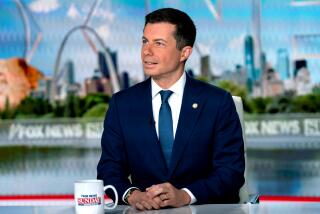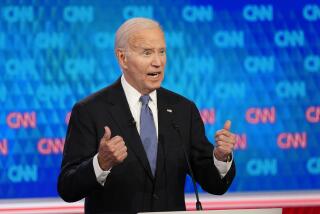Second Time Around, Forbes Looks More Like a Politician
DES MOINES — He could be yachting, jetting to his company’s private resort in the South Pacific, lolling about his 500-acre New Jersey estate or even watching his 11-year-old daughter play softball.
Instead, Steve Forbes is at the Des Moines airport, standing in line for a commercial flight to Chicago, when he stumbles--literally stumbles--on the presidential campaign trail. His foot is snagged on a woman’s purse and a small crowd watches the Republican hopeful balance on a single hoof as he struggles a full 30 seconds to free himself from the black leather strap.
Forbes’ Last Campaign Never Really Ended
He gamely smiles, betraying no embarrassment at his klutzy misstep, no hint he wishes, even briefly, he were somewhere--anywhere--else. Fiji, perhaps.
Of all the oddities (and indignities) of campaign 2000, what could be stranger than a wealthy scion blowing millions for the chance to eat bad food, stagger through airports and sleep in a different hotel each night, just so he can deliver the same shopworn speech day in, day out?
Perhaps doing it twice.
Unlike 1996, however, when Forbes’ maiden presidential campaign lasted mere months, this time he has a three-year jump on most of the competition. (For all intents, he never stopped campaigning after losing to former Senate Republican leader Bob Dole.)
He has carefully built political organizations in the early voting states of Iowa and New Hampshire, after last time relying mostly on a barrage of negative TV ads. He has delivered well over 500 speeches, visited all 50 states and spent lavishly to staff his campaign nationwide.
More significantly, Forbes has broadened his one-note, flat-tax platform to address a range of issues, in the process repackaging himself as a crusader for the religious conservatives he airily dismissed four years ago.
In short, Steve Forbes--political outsider and anti-politician--has come to behave a lot like one of those patented been-around-the-track politicians, if not quite the Washington insider he abhors. And if he seems just as much a longshot to win the GOP nomination as four years ago, he is virtually certain to have an effect on the Republican contest; he will undoubtedly stick around a lot longer than his paltry poll numbers might suggest.
“He won’t run out of money because of losing one primary, or a couple of days of bad press,” said GOP strategist Sal Russo. “He’ll persevere until he’s sure the people have made up their minds.”
Why do it again? “I guess it comes from genes,” says the 51-year-old Forbes, grabbing a Big Mac for dinner during a Chicago layover. He cited his journalist grandfather, who eventually tired of covering entrepreneurs and became one, founding Forbes magazine and its publishing empire in 1917. After 25 years of commentary, “writing about, observing and seeing some real opportunities missed, I decided to do something about it,” Forbes says. “Directly.”
Filling a perceived void, he sees his mission as rekindling the conservative torch carried by his heroes Ronald Reagan and Margaret Thatcher. His strategy, like that of most of the other GOP contenders, is simple: outflank the front-runner, Texas Gov. George W. Bush, on the right and wait for Bush’s inevitable stumble. Unlike the others, however, Forbes’ estimated net worth of $500 million to $1 billion means he can afford to wait a very long time.
Meanwhile, Forbes has begun to lay the intellectual groundwork for his candidacy through detailed speeches around the country offering his free-market prescription for health care and Social Security reform as well as his prognosis of the state of the conservative movement. On Wednesday, he launched a multimillion dollar national ad blitz, with particular emphasis on Iowa, New Hampshire, California and Arizona. “We’re putting principle and substance on the table in a way none of the others are,” Forbes says.
But if ideas are the engine that drives his candidacy, money--gobs of it--is the fuel.
In 1996, the publishing mogul poured roughly $37 million of his fortune into his White House bid. This time, he is seeking to broaden his support--and underwrite his effort--by collecting cash from others. The stated goal is $25 million, but obviously the need is less than acute.
Financial Strength Attracts Supporters
Indeed, Forbes’ bottomless checkbook is arguably his single best campaign asset. His brochure touts the publishing magnate as “the only conservative with the message, campaign team and resources to win.”
And his deep pockets have won over skeptics such as Nancy Streck, an antiabortion activist with close ties to Iowa’s powerful Christian conservative movement. Plenty of candidates are “good on message,” she says, but Forbes has the financial wherewithal others lack.
“I’ve strapped the grenades to my chest and rushed the hill,” says Streck, now Forbes’ paid liaison to the Christian Right. “This time I want to win.”
More than any issue, abortion illustrates Forbes’ evolution as a candidate. In 1996, his antiabortion stance progressively hardened as he came under increasing fire from social conservatives. Still, his flat-tax proposal remained the focal point of his candidacy.
This time, Forbes spends nearly as much time discussing issues such as abortion, school prayer and declining values as he does attacking the hated IRS and its “tax-code tyranny.” Although Forbes insists that his stance on social issues has never wavered, there has been a decided shift in emphasis that has disappointed some former supporters.
“His definition is getting muddier and muddier,” said Jude Wanniski, the father of supply-side economics and a key 1996 supporter, who has been put off by Forbes’ attempts to be more things to more people. Now estranged from his old friend, Wanniski suggests that the last time, Forbes “lost acting like the non-politician, so he’s trying to win this time acting like a politician.”
Bill Dal Col, Forbes’ campaign chief, denies any pandering on the candidate’s part. “That’s a perception spun by opponents out of personal and professional jealousy,” Dal Col says.
At the very least, however, Forbes seems more calculating. Start with his cherished flat-tax proposal. Four years ago, the plan was pummeled by critics who believed it was unfairly tilted to the rich. Now Forbes offers the proposal on a take-it-or-leave-it basis; taxpayers would have the option of filing returns under the existing system or the Forbes plan, which would exempt the first $36,000 in income and apply a single 17% rate to the rest.
And he displays a verbal dexterity that more practiced politicians might envy.
Appearing on a Des Moines call-in show, he agrees with “Carol” that the federal antitrust suit against Microsoft is a frightening overreach by the Justice Department. More often than not, Forbes says, government regulators do “more harm than good.”
But less than two hours later, at the Country Kitchen Restaurant in Ames, he nods sympathetically as Johnny Coder bemoans how lax regulation of agribusiness giants threatens to squash the family farmer. “Enforcement,” Forbes says. “That’s basic.”
Still, with his thick glasses and loopy smile, Forbes is anything but your standard-issue politician. His speaking style, to be charitable, lacks spark. His hands, locked waist-high, move stiffly. Joy, sadness, outrage all register in the same flat monotone. He seems less inclined to kiss a baby than to weigh its tax benefit.
But Dal Col suggests Forbes’ stolidness is the perfect antidote to eight years of “slick charisma” in the White House. And he sees a purity of purpose no other candidate can match.
“For most of those running, the White House is the next line on their resume, or the next rung up the ladder,” Dal Col said. “Steve Forbes is the only candidate for whom being president would be a step down in lifestyle.”
*
Ronald Brownstein’s column will appear later this week.
More to Read
Get the L.A. Times Politics newsletter
Deeply reported insights into legislation, politics and policy from Sacramento, Washington and beyond. In your inbox three times per week.
You may occasionally receive promotional content from the Los Angeles Times.











